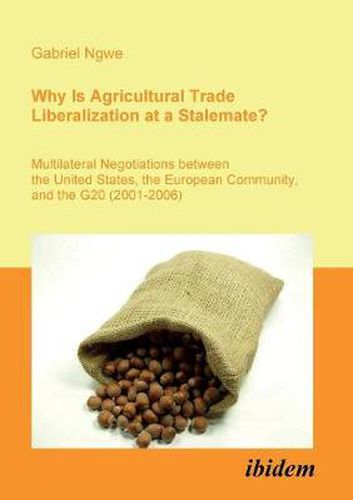Readings Newsletter
Become a Readings Member to make your shopping experience even easier.
Sign in or sign up for free!
You’re not far away from qualifying for FREE standard shipping within Australia
You’ve qualified for FREE standard shipping within Australia
The cart is loading…






This title is printed to order. This book may have been self-published. If so, we cannot guarantee the quality of the content. In the main most books will have gone through the editing process however some may not. We therefore suggest that you be aware of this before ordering this book. If in doubt check either the author or publisher’s details as we are unable to accept any returns unless they are faulty. Please contact us if you have any questions.
Trans-border trade in agricultural goods still faces immense hurdles at the beginning of the 21st century. The USA and the EU, for example, have been protecting their markets through domestic support, export subsidies and various barriers to market access. They have thus prevented many developing countries from exporting agricultural goods in which they have a comparative advantage to them. As a result, developing countries have demanded that the ninth round of negotiations at the World Trade Organization resolves the issue of agricultural protection. Gabriel Ngwe reviews the agricultural policy of the USA, the EC and the G20 prior to 2001 and discusses the evolving of negotiations from 2001 to 2006. He further explains which parties played which role in the negotiations. Furthermore, he proposes solutions how to overcome the stalemate.
$9.00 standard shipping within Australia
FREE standard shipping within Australia for orders over $100.00
Express & International shipping calculated at checkout
This title is printed to order. This book may have been self-published. If so, we cannot guarantee the quality of the content. In the main most books will have gone through the editing process however some may not. We therefore suggest that you be aware of this before ordering this book. If in doubt check either the author or publisher’s details as we are unable to accept any returns unless they are faulty. Please contact us if you have any questions.
Trans-border trade in agricultural goods still faces immense hurdles at the beginning of the 21st century. The USA and the EU, for example, have been protecting their markets through domestic support, export subsidies and various barriers to market access. They have thus prevented many developing countries from exporting agricultural goods in which they have a comparative advantage to them. As a result, developing countries have demanded that the ninth round of negotiations at the World Trade Organization resolves the issue of agricultural protection. Gabriel Ngwe reviews the agricultural policy of the USA, the EC and the G20 prior to 2001 and discusses the evolving of negotiations from 2001 to 2006. He further explains which parties played which role in the negotiations. Furthermore, he proposes solutions how to overcome the stalemate.